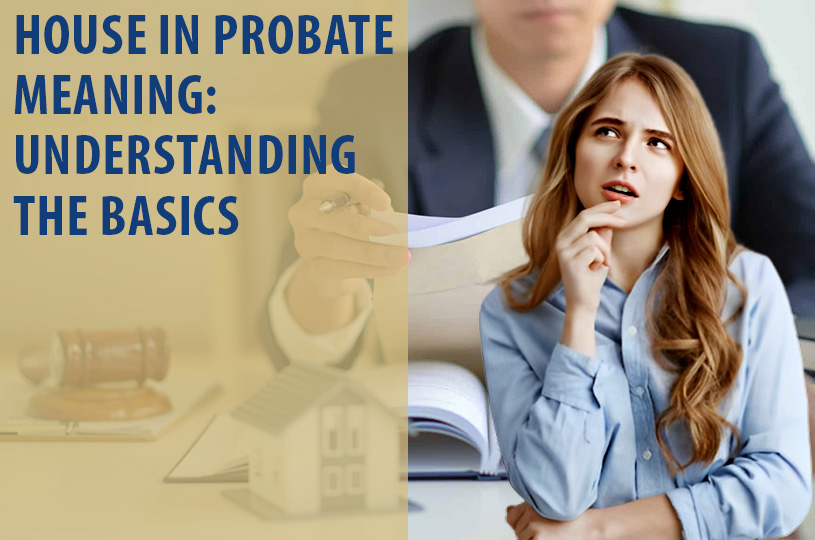When someone passes away, their estate—everything they owned, including real estate—often goes through a legal process called probate. But what exactly does it mean when a house is “in probate”? Probate refers to the court-supervised process of validating a deceased person’s will (if there is one) and distributing their assets, including real estate, to rightful heirs or beneficiaries.
This article explores the meaning of a house in probate, the steps involved in the probate process, and answers frequently asked questions about real estate probate.
What Does It Mean When a House Is in Probate?
When a house is in probate, it means the property is part of the deceased person’s estate and must be addressed before ownership can transfer to an heir. During probate:
- The court ensures the deceased’s debts are settled.
- Remaining assets, including real estate, are distributed to beneficiaries as outlined in the will or by state law (if there’s no will).
Key Points About Probate and Real Estate:
- A house in probate cannot be sold or transferred without court approval.
- If there’s no will, the state’s intestate succession laws determine who inherits the property.
- Probate can take several months or even years to complete, depending on the complexity of the estate.
Probate Meaning in Real Estate
In real estate, probate refers to the legal proceedings required to handle property left by a deceased person. A property in probate is essentially in limbo until ownership is legally transferred.
Probate in Real Estate Includes:
- Appraising the Property: The house’s value is determined to calculate estate taxes and ensure fair distribution.
- Settling Liabilities: Mortgage payments, property taxes, and other debts tied to the house are settled.
- Transferring Ownership: Once the probate court clears the estate, the property is transferred to the new owner(s).
What Happens to Property After Probate?
The outcome of a property after probate depends on various factors, such as:
Presence of a Will:
If the deceased left a valid will, the house is distributed to the beneficiary named in the will.
For example, if a parent leaves a home to their child in a will, the probate court oversees the transfer process.
No Will (Intestate Probate):
If there’s no will, the court follows state intestacy laws to determine the rightful heir(s).
Learn more about this process in our guide on how to settle an estate with no assets.
Outstanding Debts:
If the estate owes significant debts, the house may need to be sold to cover those liabilities.
Steps in the Probate Process for Real Estate
Below is a simplified guide to handling a house in probate:
| Step | Description |
| File a Petition | A probate case is opened in court to start the process. |
| Validate the Will | The court reviews and approves the will (if available). |
| Appoint an Executor | The executor or administrator is responsible for managing the estate. |
| Appraise the Property | An official valuation of the house is conducted. |
| Settle Debts | The estate pays off creditors, mortgages, and taxes. |
| Distribute Assets | After clearing debts, the court transfers ownership of the property to the rightful heir(s). |
Why Is Probate Necessary for Real Estate?
Probate ensures that:
- The deceased’s debts are fairly settled.
- Ownership disputes are resolved.
- Beneficiaries receive their rightful inheritance.
For those looking to avoid probate entirely, consider exploring estate planning options such as a living trust. Read our blog on avoiding probate court to learn how to streamline the inheritance process.
Do You Need a Probate Lawyer for Real Estate Probate?
Handling probate for a property can be complex, especially if disputes arise among heirs or debts exceed assets. Working with an experienced probate lawyer ensures the process runs smoothly.
Our guide on do I need a probate lawyer can help you decide whether professional assistance is necessary for your situation.
Can You Avoid Probate for a House?
Avoiding probate for a house can save time and money for your heirs. Here are some strategies:
- Create a Living Trust: Transfer ownership of the house to a revocable living trust during your lifetime.
- Joint Ownership: Hold the property jointly with rights of survivorship.
- Transfer-on-Death Deed: In some states, you can designate a beneficiary to inherit the property directly upon your death.
Learn more about what happens to property in trust by visiting what happens to house in trust after death.
How English Law Firm Can Help
At English Law Firm, we specialize in helping clients in Texas, Georgia, and Mississippi navigate the complexities of probate and estate planning. Our experienced attorneys can:
- Guide you through the probate process for real estate.
- Assist in creating estate plans to avoid probate delays.
- Resolve disputes involving contested wills or property ownership.
If you’re facing challenges with real estate probate or want to safeguard your assets for the future, contact us today for personalized legal support.
Final Thoughts
Understanding the meaning of a house in probate and its implications is essential for managing an estate effectively. Whether you’re dealing with probate or looking to avoid it, having the right legal guidance is invaluable.
For more insights into estate planning and probate, explore our comprehensive resources:
Let English Law Firm help you navigate the complexities of probate with confidence.

